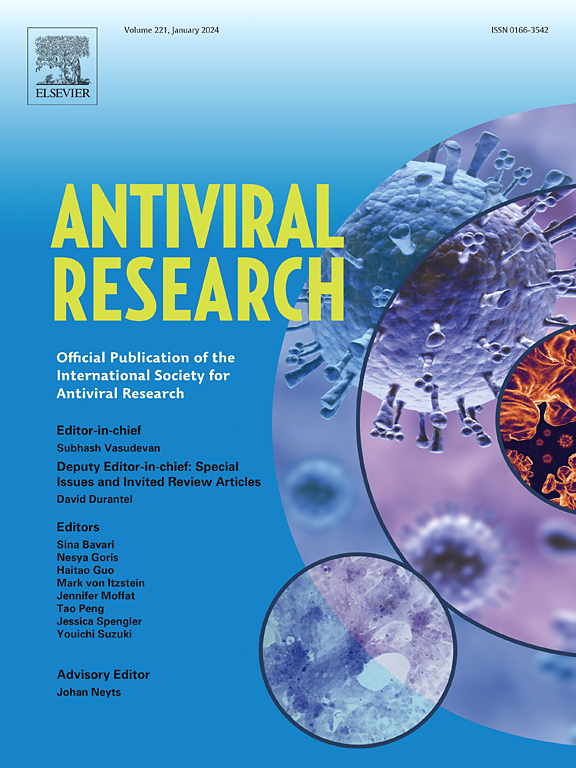替罗非班可能通过GPIbα-vWF途径抑制血小板活化,从而保护小鼠免受严重RSV肺炎的侵袭
IF 4.5
2区 医学
Q1 PHARMACOLOGY & PHARMACY
引用次数: 0
摘要
本研究旨在探讨血小板在介导致死性呼吸道合胞病毒(RSV)感染中的作用,并探讨抗血小板治疗作为RSV感染的新治疗方法的潜力。体外和体内实验研究了致死性RSV感染对血小板活化、聚集和血栓形成的影响。替罗非班(一种GPIIb/IIIa抑制剂)在缓解rsv引起的肺炎方面的新疗效也得到了评估。感染高毒力RSV毒株(R96-5)的小鼠发生严重的RSV肺炎,死亡率显著增加,并伴有广泛的血小板浸润和肺部血栓形成。原位杂交发现RSV核衣壳RNA与肺组织血小板GPIbα基因共定位。RSV感染通过GPIbα-vWF途径诱导明显的血小板聚集。值得注意的是,替罗非班显著保护小鼠免受R96-5引起的严重肺炎。这些发现强调了血小板激活和聚集在RSV感染中的关键作用,并提示通过GPIbα-vWF信号轴靶向血小板可能是治疗严重RSV感染的一种有希望的治疗策略。本文章由计算机程序翻译,如有差异,请以英文原文为准。
Tirofiban protects mice against severe RSV pneumonia by potentially inhibiting platelet activation via the GPIbα–vWF pathway
This study aimed to investigate the role of platelets in mediating lethal respiratory syncytial virus (RSV) infection and to explore the potential of antiplatelet therapy as a novel therapeutic approach for RSV infection. Ex vivo and in vivo experiments were used to study the effects of lethal RSV infection on platelet activation, aggregation, and thrombus formation. The emerging therapeutic effect of tirofiban, a GPIIb/IIIa inhibitor, in mitigating RSV-induced pneumonia was also evaluated. Mice infected with a highly virulent RSV strain (R96-5) developed severe RSV pneumonia and showed significantly increased mortality rates, along with extensive platelet infiltration and thrombus formation in the lungs. In situ hybridization revealed co-localization of RSV nucleocapsid RNA with the platelet GPIbα gene in lung tissue. RSV infection induced marked platelet aggregation through the GPIbα-vWF pathway. Notably, tirofiban significantly protected mice from severe pneumonia caused by R96-5. These findings highlight the critical involvement of platelet activation and aggregation in RSV infection and suggest that targeting platelet through the GPIbα–vWF signaling axis may represent a promising therapeutic strategy for severe RSV infection.
求助全文
通过发布文献求助,成功后即可免费获取论文全文。
去求助
来源期刊

Antiviral research
医学-病毒学
CiteScore
17.10
自引率
3.90%
发文量
157
审稿时长
34 days
期刊介绍:
Antiviral Research is a journal that focuses on various aspects of controlling viral infections in both humans and animals. It is a platform for publishing research reports, short communications, review articles, and commentaries. The journal covers a wide range of topics including antiviral drugs, antibodies, and host-response modifiers. These topics encompass their synthesis, in vitro and in vivo testing, as well as mechanisms of action. Additionally, the journal also publishes studies on the development of new or improved vaccines against viral infections in humans. It delves into assessing the safety of drugs and vaccines, tracking the evolution of drug or vaccine-resistant viruses, and developing effective countermeasures. Another area of interest includes the identification and validation of new drug targets. The journal further explores laboratory animal models of viral diseases, investigates the pathogenesis of viral diseases, and examines the mechanisms by which viruses avoid host immune responses.
 求助内容:
求助内容: 应助结果提醒方式:
应助结果提醒方式:


